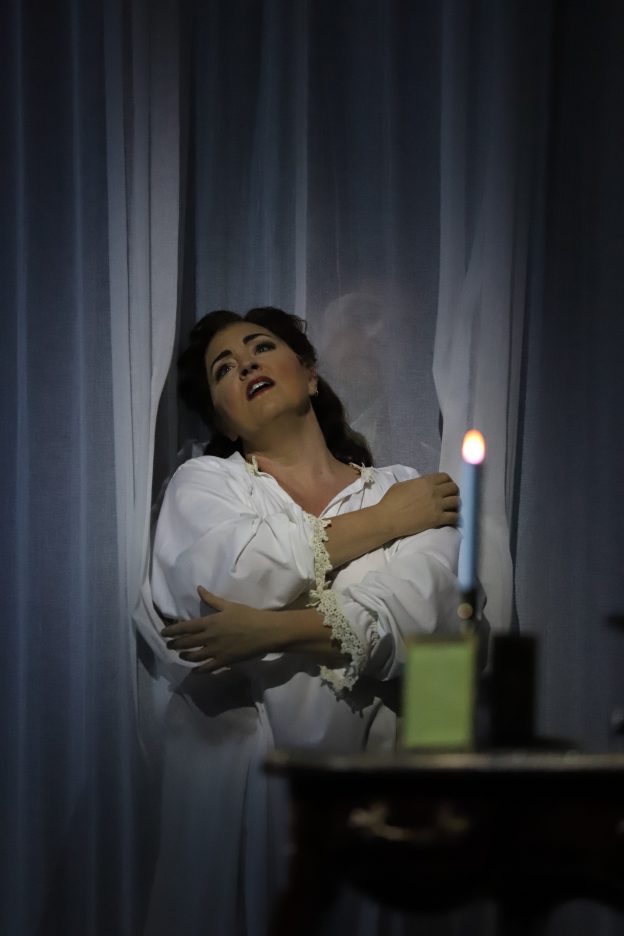
Honolulu Star-Advertiser’s TGIF – Hawaii Opera Theatre presents Tchaikovsky’s ‘Eugene Onegin’
Love, and love rejected. Dangerous flirtation. Societal demands. Betrayal. Male ego gone amuck. And if you hear gunfire, don’t worry — it’s part of the show.
It all adds up to regrets, and more regrets, in “Eugene Onegin,” the novel in verse by Alexander Pushkin that is considered one of the greatest works in Russian literature. The melancholy tale of an unrequited love and an unfulfilled life comes to Blaisdell Concert Hall this week as an opera, courtesy of Hawaii Opera Theatre, which is premiering an opulent, brand-new co-production of Tchaikovsky’s adaptation of the story.
This production will be about as Russian one could get for a production made in America and now playing in the middle of the Pacific. It will be sung in Russian, with much of the libretto taken from Pushkin’s original poetry; several of the singers are native Russian speakers, although the two leads, Ryan McKinny and Melody Moore, are American. Director Tomer Zvulun grew up among Russians in his native Israel, and guest conductor David Charles Abell even used a Russian recording of the work as the basis for his interpretation.
Above all, it will be a depiction of Russian society and culture in its classical sense: outwardly mannered, elegant and stylish, but inwardly moody and melancholy, with a heightened romanticism that has come to be known as “the Russian soul.”
“It’s very dark. They talk a lot about Russian concepts, like being bored, or being morose, or falling in love,” Zvulun said. “The characters are so much more interesting than the typical two-dimensional characters. … There’s a lot of enigmas in this show. It’s not straightforward. It’s not ‘boy meets girl, they fall in love, they end up together, she dies.’ It’s not as cut and dry.
“The basic question is: What would our past look like if we had chosen something different to do? Who would we be? What would we do? Where would we be?”
“EUGENE ONEGIN” tells the story of a young but jaded aristocrat who rejects the advances of flowering young woman Tatyana (also referred to as Tanya), not because he finds her unattractive, but because he cannot envision himself settling down.
He’s not just a man with commitment issues, said McKinny, who returns to HOT after powerful performances in “Flying Dutchman” and “Streetcar Named Desire.”
“He’s done everything he thought he wanted to do. He’s had all these parties, been with a lot of women, and he’s not satisfied,” McKinny said, “so in some kind of existential way, he’s dissatisfied with life. That’s his main struggle. … He doesn’t think he’d be happy with anyone. In his big speech in Act One, he says, ‘I’m not really made for the life of a person who gets to be happy.’”
As Onegin, McKinny sings some great arias in the first and third act. And after Onegin dances flirtatiously with the fiancée of his friend Lensky (Russian tenor Viktor Antipenko), Onegin and Lensky proceed to fight a duel. (This was a major part of traditional Russian society — Pushkin himself died from a wound sustained in a duel.)
“He regrets it. That’s a big cloud over his head,” said McKinny.
THOUGH THE opera is named “Eugene Onegin,” Tchaikovsky himself wanted to call the opera “Tatyana,” since much of the opera revolves around her.
Moore, who also starred in HOT’s “Flying Dutchman” as well as “Faust,” sees the character as a girl with “raging hormones” yet with a maturing sense of what she wants.
“It’s both teenage impulsivity and lack of control and the knowing, this itching feeling, that it’s not just any man, it’s him,” Moore said.
That is all expressed in the “Letter Scene,” the opera’s most famous section. Featuring a beautiful, 17-minute long solo aria in which Tatyana pours her heart out to Onegin in a letter, it is considered one of the great monologues in the repertoire.
“That gives you the time to understand that she’s not willy-nilly writing it out, she’s really thinking it out,” Moore said. “She has to say in the end that ‘I’m going to stand by this. His honor is enough reason for me to send this.’ And it turns out he’s not that honorable.’”
Like all opera singers, Moore is accustomed to singing in foreign languages, but Russian has been extremely challenging, she said.
This is her first time singing in Russian. (McKinny will be performing as Onegin for the first time but sung other roles in Russian.) Moore laughs now, remembering when HOT invited her to perform the role.
“I listened to it, but to be honest with you, I didn’t listen critically; I listened more for the beauty, and I loved it. Little did I know how absolutely horrifyingly difficult this language is,” Moore said. She made extensive cheat sheets written in the International Phonetic Alphabet to help her through the difficult sections.
LANGUAGE ASIDE, Tchaikovsky’s rich, melodious score has plenty to offer.
“There’s everything in this music, from very intimate to very grand,” said Abell, the conductor, citing two arias sung by Lensky, a love song in the first act and an introspective song in the second act as he prepares to duel Onegin. “They are just heart-breaking pieces of music.”
Abell is making his HOT debut with “Eugene Onegin.” To prepare, he studied the libretto extensively. He found inspiration from a 1955 recording of the Bolshoi Opera Theatre.
“It is the most subtle, beautiful recording, so I’m trying to model my own performance around that, which I believe to be the authentic Russian tradition,” he said.
The music should resonate with fans of Tchaikovsky’s famous ballet works, like “Swan Lake” or “Nutcracker,” or his great concertos for piano and violin, Abell said.
“It is the height of 19th-century Romanticism, and the Russian version of the height of 19th-century Romanticism. It doesn’t get more symphonic and romantic than that.”
By Steven Mark for The Honolulu Star-Advertiser
